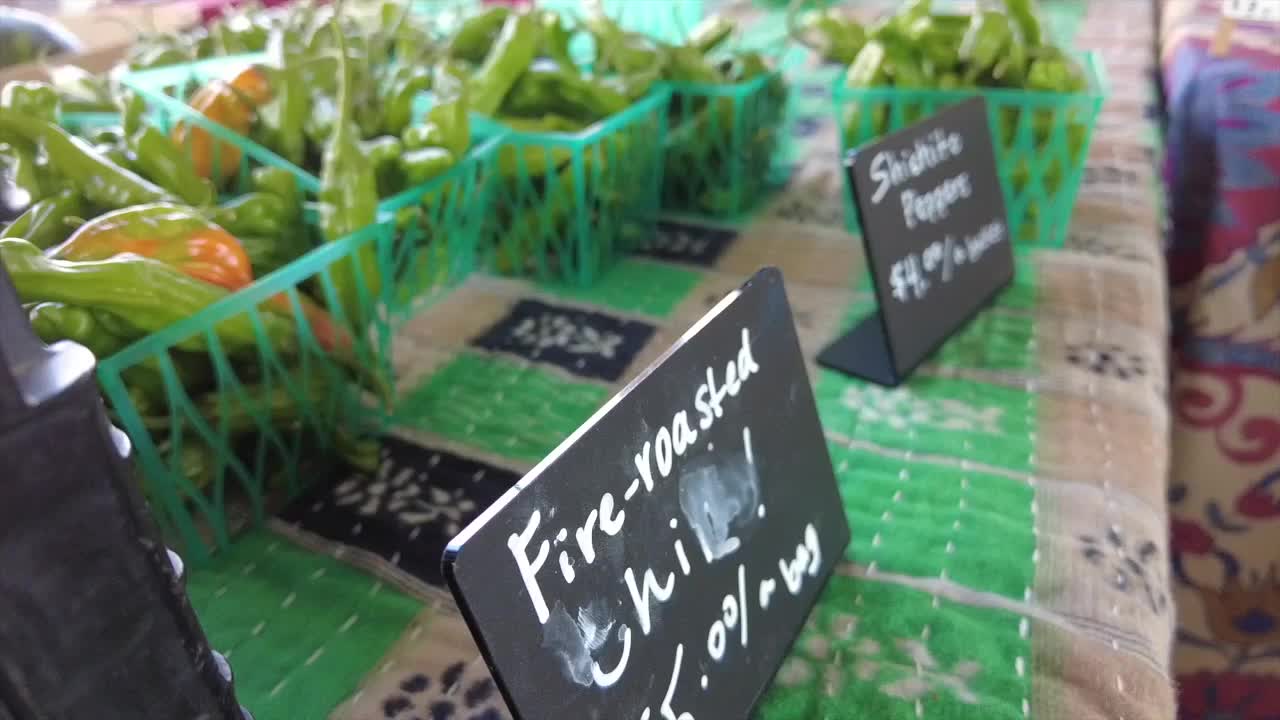PHOENIX — Half of Americans now say food costs are a major source of stress, according to a recent Press-NORC Center poll. With inflation lingering and sweeping tariffs taking effect against dozens of countries, many consumers say the pressure on household grocery budgets is rising.
Last week, long-delayed tariffs went into effect, ranging from 10 to 50 percent. Items like seafood, fruit, and olive oil are among the food imports most likely to see price hikes. Some experts say consumers could initially pay 7% more for fresh produce before prices stabilize, according to Budget Lab.
But is there a way to bypass the instability?
For shoppers like Gino Meriano, the answer is simple: buy local.
“I probably save around $10 to $15 a week,” Meriano, a regular at the Downtown Phoenix Farmers Market, said. “Even though it’s more expensive here, I get better quality. If you plan your meals, you save money.”
Beyond the value, Meriano says it’s also about predictability. He avoids impulse buying, sticks to his shopping list, and supports local farms — all while sidestepping the uncertainty of global price pressures.
“If you keep, you know, sort of jacking up the prices, and you're adding tariffs, you're adding taxes, whatever, then the more times that people start to realize you've got places like this,” Meriano said.
Laura Mudd, a vendor selling produce on behalf of Crooked Sky Farms, says local pricing is often more stable than what consumers find at chain grocers.
“Tariffs can affect everything, but you don’t have to worry about that affecting your produce bill if you're shopping at the farmers market,” Mudd said.
Still, no farm — no matter how local — operates in a vacuum.
EverKrisp Vegetables Inc., a third-generation Arizona farm, supplies produce to grocery chains like Sprouts and Kroger. Co-owner Abbie Etchart Fraser says buying local does help consumers avoid certain costs, particularly those tied to transportation — often referred to as "food miles.”
“When you buy something grown close to you, that product doesn't have to travel hundreds of miles,” Etchart Fraser said. “That saves on fuel and freight costs.”
However, she says her business hasn’t been immune to tariff-related challenges. EverKrisp partners with growers in Mexico to produce green onions, which need a particular climate. When tariffs were reinstated, they created confusion and financial strain.
“It was nerve-wracking,” Etchart Fraser said. “We had to take on extra costs ourselves, to support our growers and pay for compliance.”
Tariffs have also driven up operational costs.
"We have a lot of supplies that we need, from cartons to twist ties, fertilizers,” Etchart Fraser said. Due to the uncertainty, their prices have been raised, whether it's directly related to tariffs or it's just the unknown costs that they see coming, we have noticed those changes with the incoming tariffs."
Jim Rounds, President of Rounds Consulting Group, explains that while companies have absorbed most of the burden so far — about 64% of companies have absorbed most of the burden so far, according to Goldman Sachs — the load is shifting. Economists project that by fall, two-thirds of the cost will fall on consumers.
“Even local farms still buy fertilizer, tools, and packaging that may be impacted by tariffs,” said Rounds. “It’s difficult to say whether buying local will save money in the long term.”
Still, the situation could present an opportunity. Rounds notes that if domestic growers gain a competitive advantage over imports, they may be able to scale up. That’s something EverKrisp is already considering.
“We certainly have land we could expand on,” Fraser said. “We’re hoping to grow more items or increase volume on what we already sell, like cabbage.”
There is an appetite for the shift.
“No tariffs, no nothing. Pay that little extra and they're good to go,” Meriano said.
Shopping local is something that many consumers, like Meriano, are hungry for.
This story was reported on-air by Jane Caffrey with the Scripps News Group station in Phoenix and has been converted to this platform with the assistance of AI. Our editorial team verifies all reporting on all platforms for fairness and accuracy.










